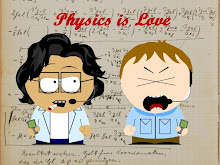So, since when was "philosophizing" synonymous with "speculating?" Obviously, there are traits the two actions share, but it seems quite a bit unfair (notice the rhyme) to lump those two together. Still, I can't help but think that these two actions, philosophizing and speculating, are pretty much what makes up the foundation of my being. Or, at least my current obsession.
Truth is, I haven't noticed how I've narrated my life until quite recently. Well, it's more like, I've watched television shows that are narrated by a protagonist, which would obviously mean that the protagonist should be the highlight of the show, yet there is a sense of omniscience the viewer is given, something that is not necessarily common with a first-person account in writing. Perhaps it's due to the different media, but I find myself doing the same--narrating events that are beyond my presence. But maybe I'm not narrating them myself--obviously I read events or hear about them from secondary sources like periodicals, but I find myself distancing myself from my body in order to narrate them. But to whom? Do I narrate this just because some day, it might make a great read and a sustainable source of income for whatever drug habit I've developed? Do I narrate this, hoping to structure it in such a way that I follow the narrative features of a novel or story (televised or not) in hopes that I too can become a hero or heroine? Perhaps I dictate this to myself, a distanced, detached self, who is in need of reawakening?
Anyway, I've realized that I have a wonderful gift of disappearing into the realms of self-narration and watching television shows. To be honest, it's not necessarily like I do it on my own. In fact, a friend of mine has introduced me to Scrubs and Dead Like Me, two of the more talkative shows in terms of narration, but I don't know if I myself narrate like that. Perhaps I do and I'm just not aware. Perhaps I find it attractive and force myself to follow such a style. In either case, I've found myself becoming more prone to rambling, incomplete thoughts, and loose semiotic associations--whereas, before, I would polish... oh, what the hell am I saying? I've always had a sense of aloofness when discussing ideas. It's as if I believed that merely invoking the name of a concept or a thinker would somehow evoke some sort of magical powers that will make my argumentation much more powerful by the presence of the holiest of holies--dead intellectuals. It's amazing how I do this speculating and still manage to stay in school. But I've really come to a point where I've lost my ability to concentrate on anything practical or immediately important. All of my attention has turned upwards, towards the ideals of Plato, if only in the case of me attacking them. I admit, I turn to metaphysics much too often for my own good, which probably makes me a hypocrite. However, there's something extremely alluring about Platonic mysticism that has drawn me to seek it and explore it. It's truly different--explaining a phenomenon and actually experiencing it. Perhaps I'm going through some sort of spiritual enlightenment. I can only hope.
It seems interesting to me that Bertrand Russell gives us two major camps in Classical Greek philosophy that I can pretty much attribute to the entirety of philosophical discourse: on the one hand, you have the Dionysians with bacchanalia and all sorts of emotional ecstasy. On the other hand, you have the polytheists, using cool logic and reason to explain phenomena. I admit that my interpretation could be extremely off, especially since it has been far too long since I've last touched Russell's The History of Western Philosophy. I have, myself (although not claiming this categorization to be original at all), deduced two camps--metaphysicians and materialists. However, it becomes even more difficult, as the methods used by the metaphysicians include both reason and mysticism. However, reason seems to be most closely tied to materialism, as the criterion of physical reality seems to be the most immediate (I can already hear the postmodernists claiming my "privileging" physical reality over other necessary realities). As I have explained in one of my previous posts, it seems to me that I categorize modes of thought in two ways--reason and mysticism (mysticism being the set of thought such that it is the complement set to reason in the universal set of thought; or, less pretentiously, anything that is not reason). But now that I look at it, why do I make such distinctions in the first place?
Recently, I've been very drawn to Judaism. My friends will probably blame it on my Semitophilia (I can't help it; I happen to think that Jewish men are extremely attractive), but there is a certain rigor to Judaism. All of the commentaries, all of Jewish thought, is argued with extremely comprehensive evidence and tidy logic. Of course, this doesn't help the fact that the basis of all of this reason is a set of texts that was "revealed" (i.e. not reasoned out, but inspired mystically), but maybe there is something to Judaism that reveals a fundamental truth within reality. Then again, we can say the same thing about any religion, especially given the tendency for Eastern mystics to show their compatability with some interpretations of modern physics. Maybe it's this value of truth that I must finally abandon before I become fully committed to my nihilism. Whatever it is, I have to resolve it or ignore it so I can get back to work. Now that, my friends, is an extremely sad revelation.
Monday, May 28, 2007
Subscribe to:
Post Comments (Atom)


No comments:
Post a Comment